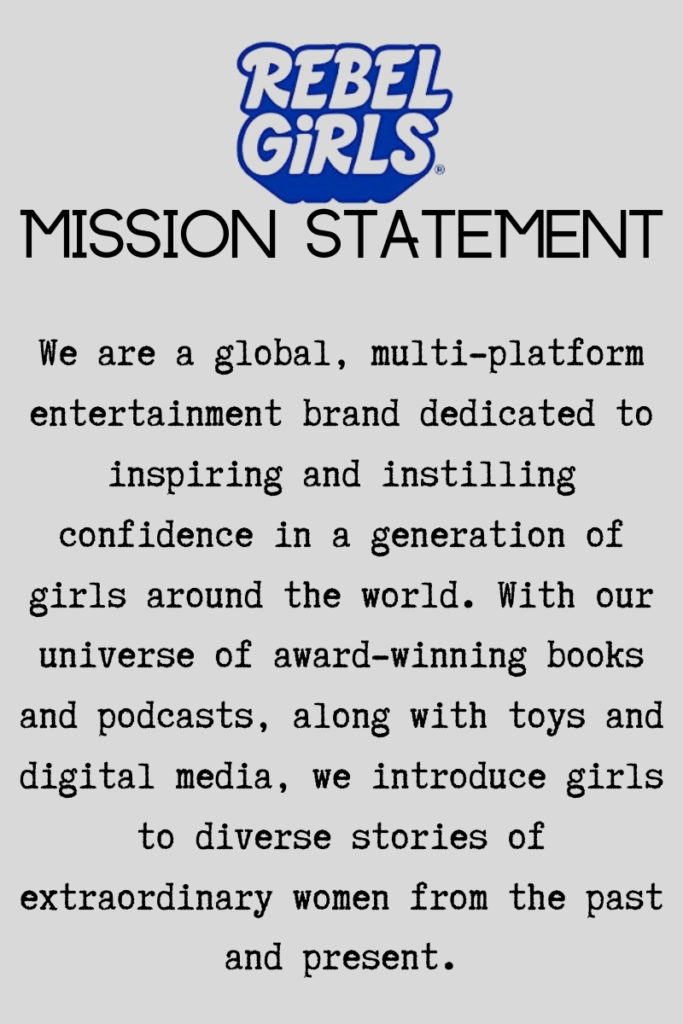- About Us
- Advertise with Us
- Bios
- Books & Resources
- Books We Love
- Contact Us
- Disclosure
- Glossary
- How We Select Titles
- Our Story
- Resources
- Suggest Your Book
- Where to Find Heart.Wants.Book
- Where to Find Heart.Wants.Books
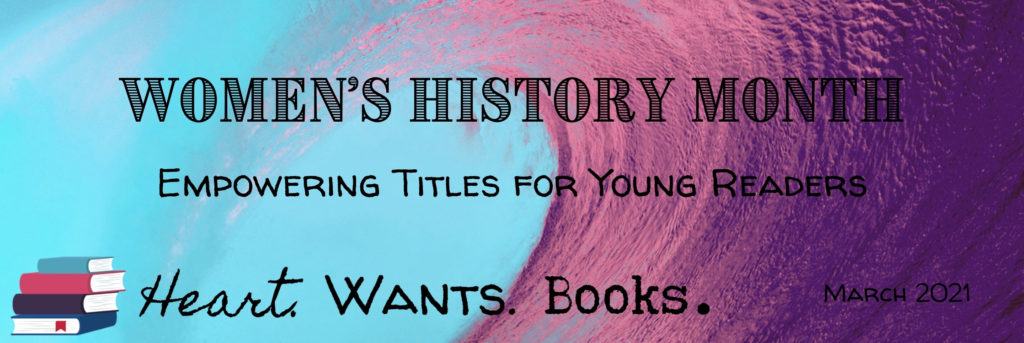
The following post includes affiliate links. More details here. As you’re doing your Amazon shopping, we’d be ever so grateful if you’d use our affiliate link to do so as it helps pay the bills around here!
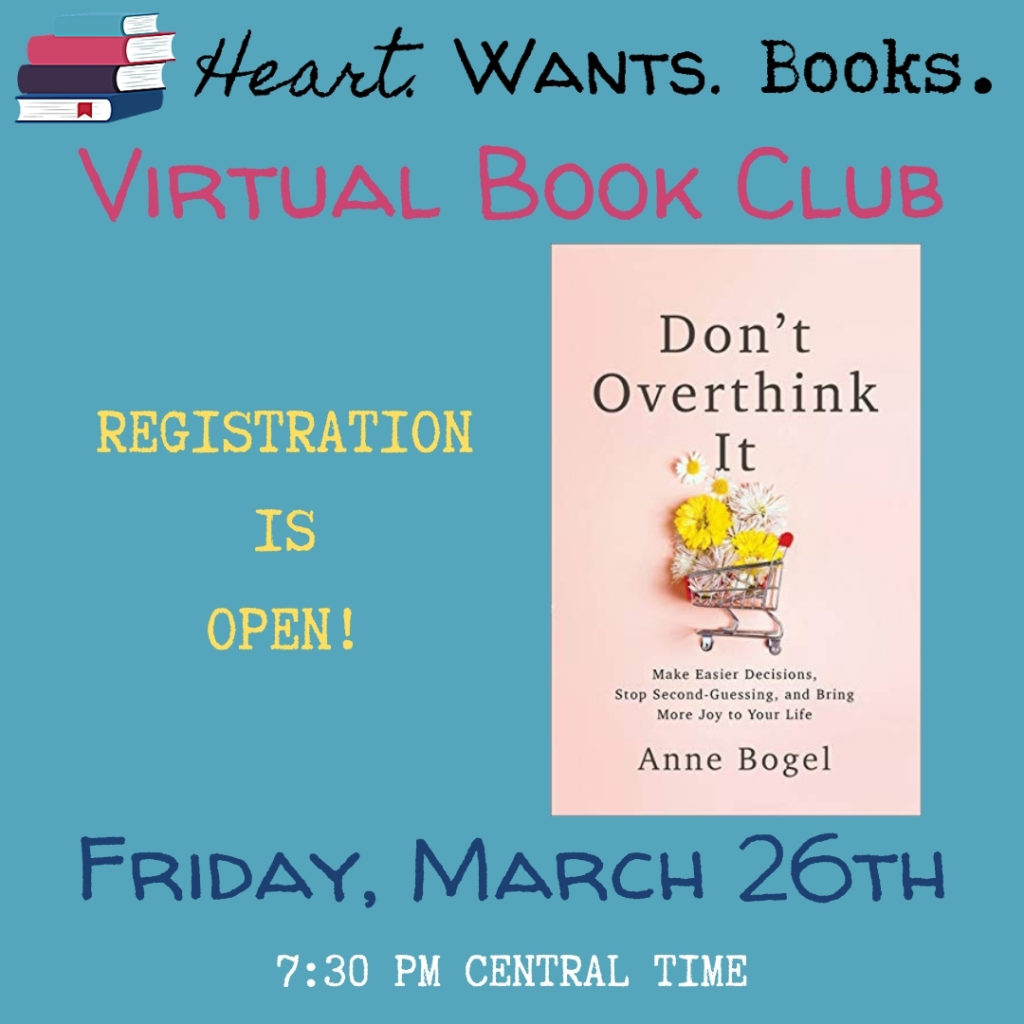
I’ve already shared that I try not to overthink what my children read, but sometimes I do. Are they reading enough [people who don’t look like them]? That’s something I do consider, and I do consciously suggest books by women, and books by and about BIPOC to my white, male children so they can spend those pages with a friend whose lived experience is not the same as theirs. I try to suggest and not overthink it, and I’m excited to start Don’t Overthink It: Make Easier Decisions, Stop Second-Guessing, and Bring More Joy To Your Life by Anne Bogel so I can overthink fewer and fewer things! If you’d like to join in the conversation on Friday, March 26th at 7:30 p.m. CST, sign up here to get the link in your inbox!
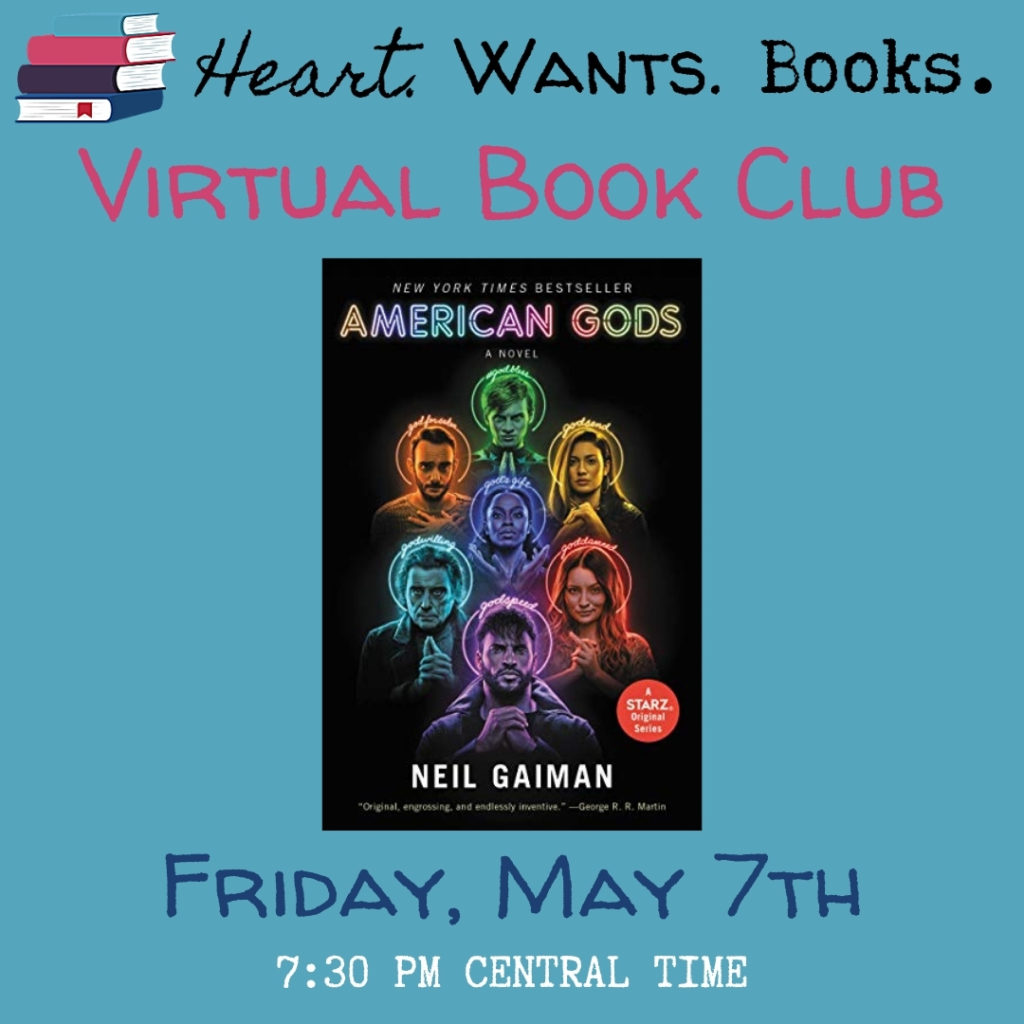
And for your reading pleasure, we have an extra Virtual Book Club announcement today! After we discuss Bogel’s latest book, we’ll gather on Friday, May 7 at 7:30 p.m. CST to discuss Neil Gaiman’s American Gods (which, as of this typing, was on sale for $2.99 for the kindle edition and we one-clicked quite quickly). Happy reading!

When we were considering what to bring you for Women’s History Month, we knew that needed to include titles for the young readers in your life. I don’t remember the specifics on a lot of books I read when I was younger, but I remember having a conversation with my school librarian about Christy by Catherine Marshall. Originally published in 1967, this title feels like the inspiration for When Calls the Heart by Janette Oke, which was published in 1983, or maybe Elizabeth’s story is just the Canadian version. (The Hallmark television show by the same name starts very similarly, then deviates significantly, though both are a joy.) My personal favorite heroine from my younger years is Alanna, of Tamora Pierce’s Song of the Lioness series. For some reason I only read the first two books when I was younger, but a few years ago I revisited these books and consumed them, along with most of the other books in Pierce’s Tortall Universe. While these Pierce’s books are very different from those of Marshall and Oke, they have similar themes of young women believing in themselves and their ability to realize their dreams, persevere, and generally live their best lives even when they were told to stay at home and be good young ladies. Oke and Marshall’s teachers adhere to convention much more than the women of Tortall, but if we’re going to launch into a fantasy world, then I’m here for shooting for the moon, and Alanna does, along with Daine, Keladry, and Aly.

We would be remiss if we didn’t include Nancy Drew in our discussion. She was ahead of her time in openly leading the boys, solving mysteries, and generally making things happen. While Nancy appeared on the scene three years after the Hardy Boys, she’s definitely not least in our book. It’s much easier to be what you can see and even in 1930, Grosset & Dunlap and a series of writers knew it was worth Nancy’s stories worth it, and generations of women are so grateful to join in Nancy’s adventures. For younger readers, or those who like a bit more fantasy with their mysteries, Thea Stilton might be a nice pick. Thea and her uncle Geronimo are well loved characters in my house, especially by my six-year-old. He is indisposed for hours after he brings a new title home, only to be interrupted by parental demands that he eat or bathe. Superheroes are also a hit at my house, and I was delighted when my boys picked out a couple of titles from the DC Super Hero Girls series (and then asked for more). I read one with them, and while they do feel like high school to me, they’re still accessible to my elementary aged children as the themes are about friendship and acceptance, at least in the couple they have read.
I would feel remiss without mentioning a few titles that are favorites at my house, either for me, my people or both, so here they are:

- Anne of Green Gables by L.M. Montgomery, and subsequent titles in the series
- Wizards of Once series by Cressida Cowell tracks the adventures of Wish (female) and Xar (male) and my nine-year-old and I are looking forward to reading the last book to see how it ends.
- The Unicorn Quest by Kamilla Benko is a series my nine-year-old is currently consuming about two sisters adventuring in a land of magic.
- To Night Owl from Dogfish by Holly Goldberg Sloan and Meg Wolitzer is a modern epistolary tale of tweens coming to terms with their dads dating while at camp together.
I’m curious dear readers, what books by and about female characters pulled you in as a young reader? What titles from back when still speak to you today?
~Nikki
Darling Readers, it seems that I am happily discussing some of my favorite feminist writings, baby board books and picture books for young readers. I happen to be the BAE to several young humans, that’s Best Aunt Ever if you couldn’t figure that out from context clues, and I have made it my goal and honor as the BAE to provide reading material for all of these smol humans. Here is a not overly extensive list starting from age Zero:
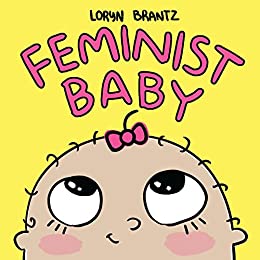
Feminist Baby, Feminist Baby: He’s a Feminist, Too!, and Feminist Baby Finds Her Voice by Loryn Brantz – three brightly colored, short sentenced, board book choices for the newest feminists in your life. Just be warned, feminist baby says no to pants in book one.
The Questioneers Picture Books Series features five young characters, the female focused books being Rosie Revere, Engineer, Ada Twist, Scientist, and Sofia Valdez, Future Prez. All of them are written by Andrea Beatty and illustrated by David Roberts.
Other picture book series that do not focus solely on women’s history topics include: the 67 book Little People, Big Dreams Series, the 23 book Ordinary People Change the World Series, the 98 book My Early Library: My Itty-Bitty Bio Series, and the ever-popular 191 book Who Was? Series.
She Persisted: 13 American Women Who Changed the World, She Persisted Around the World: 13 Women Who Changed History, She Persisted in Sports: American Olympians Who Changed the Game is a series of three picture books written by Chelsea Clinton and illustrated by Alexandra Boiger. “In early 2017, Senator Elizabeth Warren’s refusal to be silenced in the Senate inspired a spontaneous celebration of women who persevered in the face of adversity.” These books are a collection of stories of women past and present who have done just that, persisted.
Good Night Stories for Rebel Girls: 100 Tales of Extraordinary Women, Good Night Stories for Rebel Girls 2, and Good Night Stories for Rebel Girls: 100 Immigrant Women Who Changed the World, and Good Night Stories for Rebel Girls: 100 Real-Life Tales of Black Girl Magic (pre-order for the September 28, 2021 release) are a series of books compiling the stories of 400 remarkable women from past and present that are sure to inspire the newest generation of Rebel Girls. Each book is authored, illustrated, and edited by women. There is also a collection of five chapter books for those young readers that are reading on their own. I absolutely love the Rebel Girl mission statement, and want to share it here if you’re interested in supporting their mission by purchasing directly from their website for Rebel Girl books, apparel, and stationary. There are also a podcast and many free resources and activities for girls of all ages.
As a Lifetime Member of the Girl Scouts of the USA I have a passion for books, media, and other organizations that promote the past, present, and future of women and girls all over the world. If you have favorite women empowering books or organizations you love, please share them with us in the comments.
~Ashley
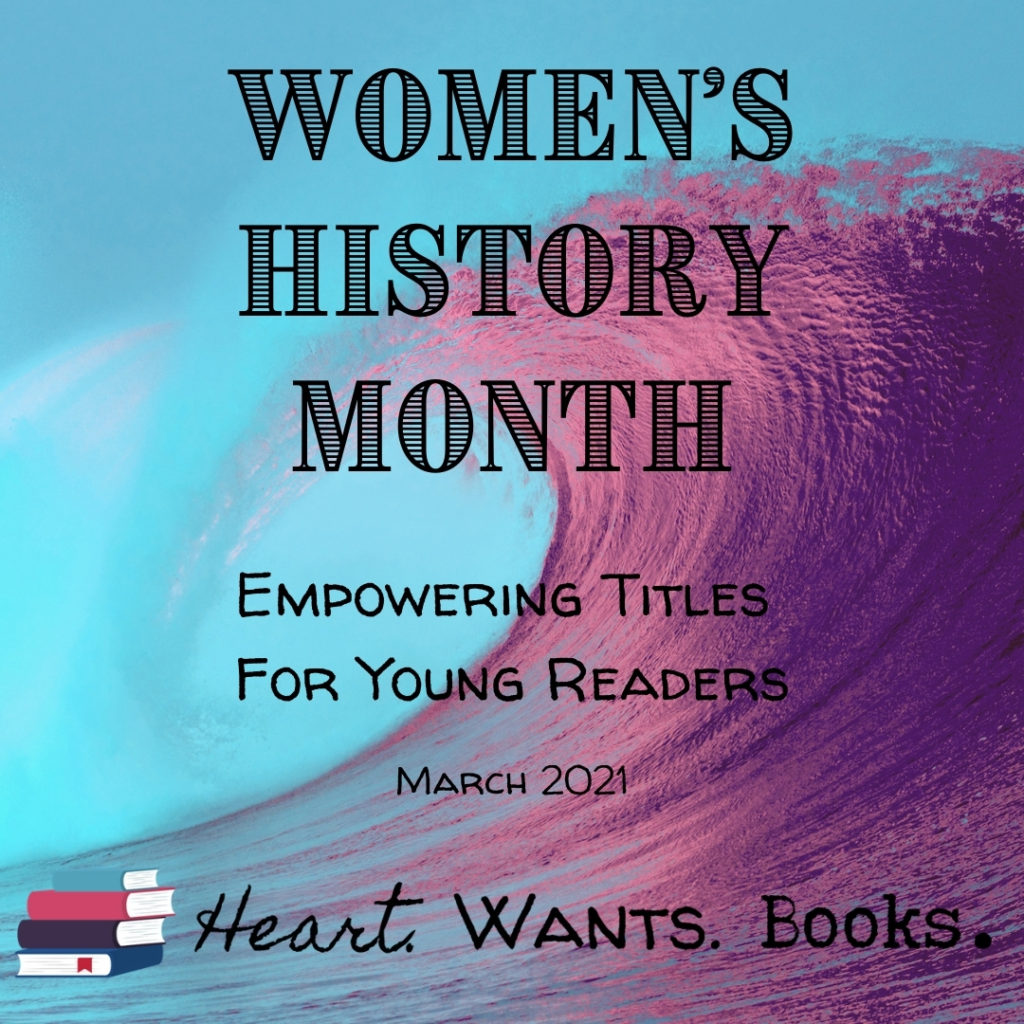
PLEASE SUPPORT US WHEN YOU SHOP BY FIRST CLICKING ON THE IMAGES BELOW:
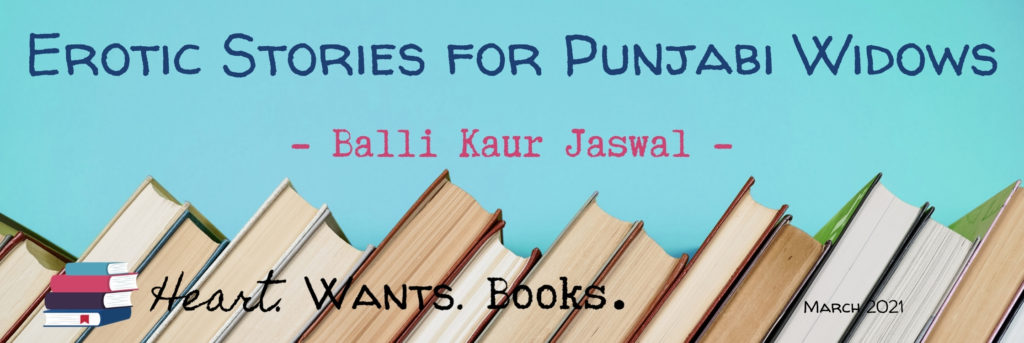
The following post includes affiliate links. More details here. As you’re doing your Amazon shopping, we’d be ever so grateful if you’d use our affiliate link to do so as it helps pay the bills around here!

As we’ve been talking about our next Virtual Book Club pick, I’ve been thinking about all the things I do overthink, and some of the things I don’t. One thing I don’t usually overthink is what my children read. They’re reading high level, low content titles, so I do have to be mindful of that on occasion, but in general, they read their assigned books and whatever interests them from the library or home shelves. Yes, this does mean my then eight year old started A Tale of Two Cities by Charles Dickens and it lived in his bedside stack for about a week before he gave it up. However, when I was reading with (as in next to) my (now) nine year old before bed last week, he saw me open my kindle book and said “mom, can I read er-o-tic stories?” “Ah, no, no you may not dear. It’s for adults, not nine year olds.” Y’all! The struggle is real! And then I said a quick prayer for him not to ask what erotic means. So far so good, but you never know when it’ll pop up again! If you’d like an update of if my child has asked me to define erotic, please join us on Friday, March 26th at 7:30 p.m. CST when we’ll discuss Don’t Overthink It: Make Easier Decisions, Stop Second-Guessing, and Bring More Joy To Your Life by Anne Bogel and maybe the perils of living your best reading life around little people (and maybe I’ll tell you the story of my Adam’s reaction to glancing at this post over my shoulder as I was drafting it…he just saw the title). Just don’t forget to sign up here to get the details on joining the conversation.
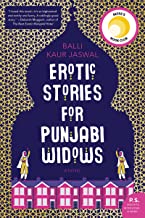
My memory tells me Erotic Stories for Punjabi Widows by Balli Kaur Jaswal was everywhere when it first came out in 2017, or maybe it was when it was selected to be a part of Reese’s Book Club in March 2018. Either way, when I saw it was a part of Prime Reading in September, I borrowed it superfast and shoulded on Ashley to do the same! Yes, we’re slow to get around to reading books with no deadline, we know, but we get there eventually! The only thing I regret about this book is that I waited so long to read it!
Erotic Stories for Punjabi Widows is the story of an older woman who is trying to be of service to the women of her community by having English classes for them at the temple, and the younger woman she hires who is trying to find herself as a “British and Punjabi and Sikh” woman. This story is about immigration, how families react to it, and how communities of people gather to support each other. It’s about generations as cultures evolve, and it’s about gender roles, and people, young, old, and in between, finding their way, and charting new territory.
At the heart of Erotic Stories for Punjabi Widows, it’s the tale of two sisters, one is traditional in the way of her parents, and one is not, and seeks to find her own way, following a winding path to do so, which includes some input from our titular widows. And it’s also very much about the widows, and their erotic stories. While the titular stories are included, and as described, why the widows are drawn to create and share these stories is really what makes the book so powerful. Our group of widows includes some who had amazing marriages before their husbands passed away, and others who had fine marriages, and even others who suffered through horrible marriages. Some women write stories of what they miss while others write of what they never got to experience. There is no shame, no guilt, and only a little shyness once in a while. This amazing group of women are the true stars of the book as they gather together and create their stories to share with each other of their private experiences or fantasies.
It doesn’t hurt that I (accidentally) read this title in flyte with Winter’s Widow (The Wicked Winters Book 12) by Scarlett Scott. In this open door, regency romance, widow Mirabel asks Demon Winter for his help in acquiring a lover. He obliges, personally, and she learns all about what she was missing in her loveless marriage that made her a duchess and gave her three children, but zero passion. This type of relationship is what all our Punjabi widows, and everyone really, deserve to find!
I want to say more about Erotic Stories for Punjabi Widows, but also I want you to experience it (and if open door isn’t for you, it would be super simple to skip the widow’s stories). Goodreads classifies this title as contemporary fiction, but it could also be feminist fiction or multigenerational, and there are elements of romance and thriller too. I give this genre bending title an emphatic 4 stars and may reread it, but will definitely recommend it!
~Nikki
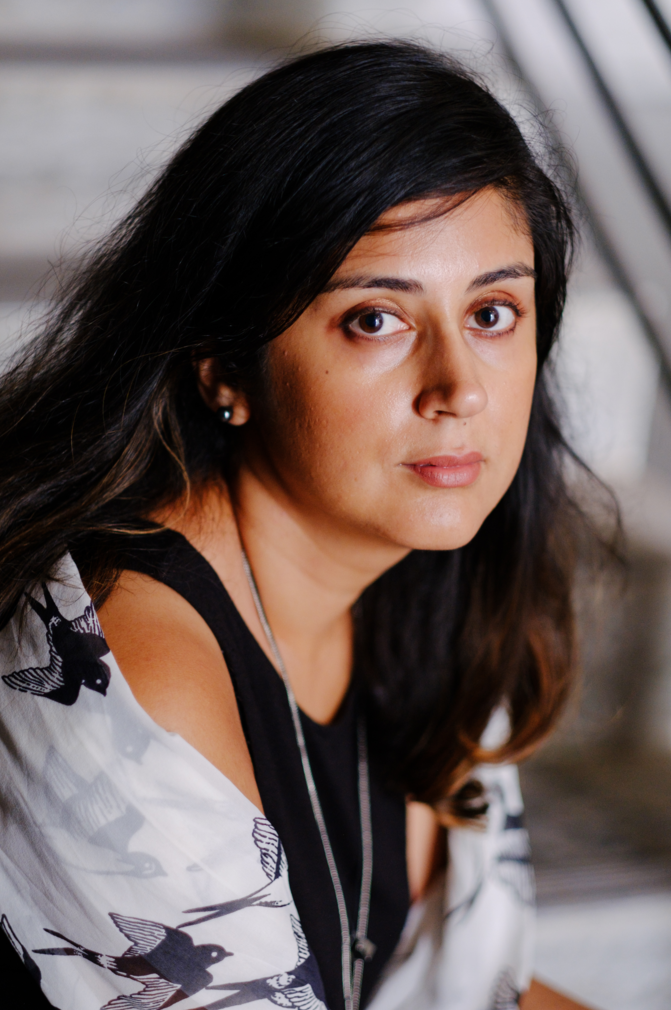
Balli Kaur Jaswal is the author of 4 novels: 2013’s Inheritance, 2016’s Sugarbread, 2017’s Erotic Stories for Punjabi Widows, and 2019’s The Unlikely Adventures of the Shergil Sisters. I am here for her entire backlist and any future releases. Inheritance won her the Sydney Morning Herald’s Best Young Australian Novelist award in 2014. Erotic Stories for Punjabi Widows has been optioned for film by Ridley Scott’s production company Scott Free Productions and Film Four in the UK. Happily, it has also been translated into 15 other languages! Jaswal’s short fiction and non-fiction works have been featured in multiple publications and periodicals. She was a writing fellow at the University of East Anglia in Norwich, England, and taught creative writing at Yale-NUS College and Nanyang Technological University, both in Singapore, where she is currently working on a PhD.
This is one of those books, as Nikki stated above, that had been on my radar for years. A friend of the blog, and former roommate extraordinaire – you know who you are, read this book in 2018 and had recommended it to me way back then. It was just my getting around to reading it that was problematic. (Don’t @ me because I have read ACOTAR more than 5 times in the same years I could have read Erotic Stories, OK?!) This book was everything I wanted and expected and then some. Was I frustrated at the older generation of women, absolutely. Was I oftentimes just as frustrated with the younger women who were trying to balance their needs and desires for modernity and their needs to be able to fit in with their community? Also, yes. But, this is the balancing act many/most/all women of younger generations have to handle with their elders. I have experienced similar things in my own life. These are seemingly universal issues and it’s great to be able to experience them from another’s point of view. What, you mean by reading diverse books?! Yuppers I do.

My favorite part of Erotic Stories for Punjabi Widows though, was the way Jaswal brought Southall, London, to life on the page. Nikki and I are middling-ly-well traveled, but neither of us have spent time in the UK. But, we’re familiar with public signage not only in different languages, but in multiple languages. Nikki specifically in multiple types of scripts. We’ve been honored to experience cultures and religions that are different from our own in their birthplaces. But, I love a good immigration story. It might be because I have a Canadian Adam that lives in my house, but it’s also because these stories are about how two peoples who are so different can learn to not just tolerate but celebrate each other’s cultures and traditions, then create new ones. I am American enough to admit that I truly enjoy the stories of immigrant peoples, and how those immigrant peoples congregate together in their new home to form a culture like and yet unlike the one they left [see also Re Jane]. I don’t think that these widows would have had the bravery to tell their erotic stories in such an open way in India, there would have been other expectations of them as widows. I think they needed to have the confidence of an immigrant experience to understand their ability and even need to express themselves in such a new way. And that’s a strength that’s rarely talked about.
How are you celebrating the diversity of women in your reading life this month?
~Ashley
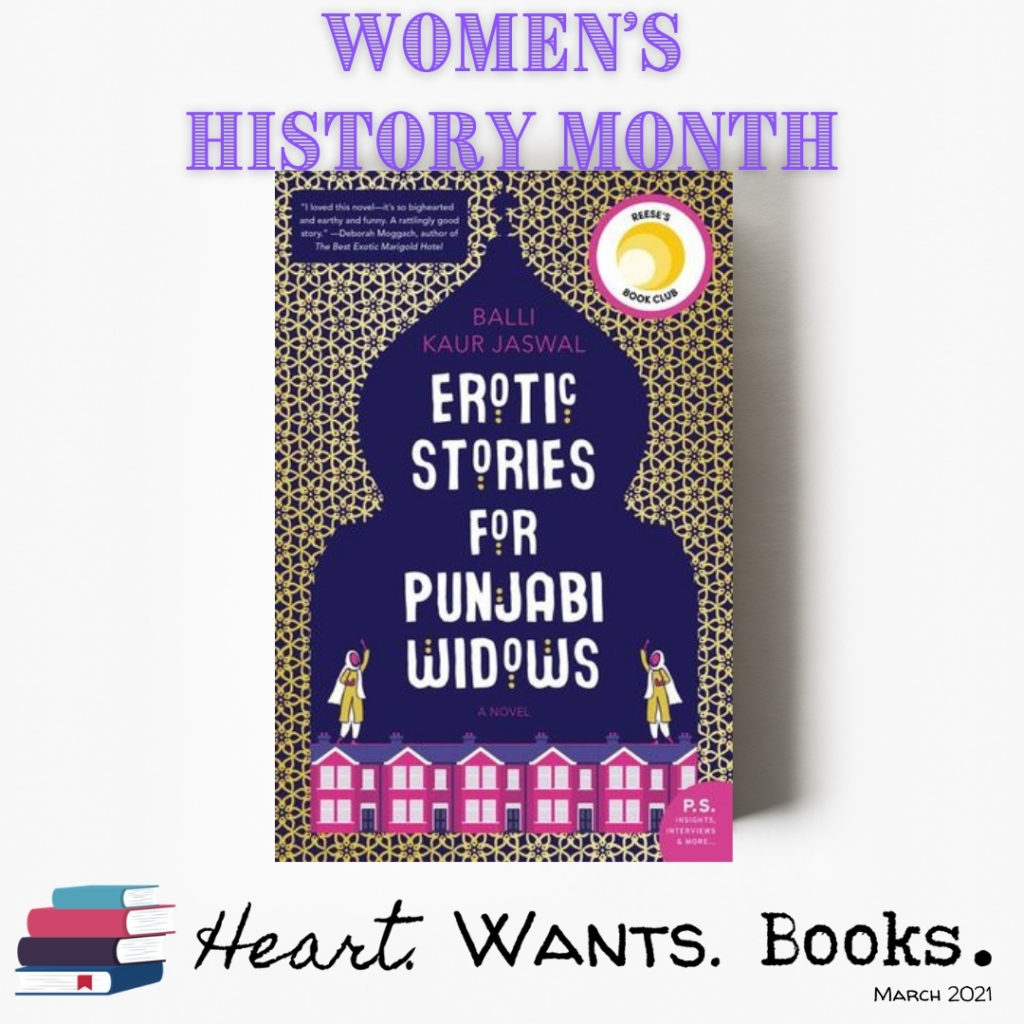
PLEASE SUPPORT US WHEN YOU SHOP BY FIRST CLICKING ON THE IMAGES BELOW:
A Collection of Non-Fiction Titles
March 15, 2021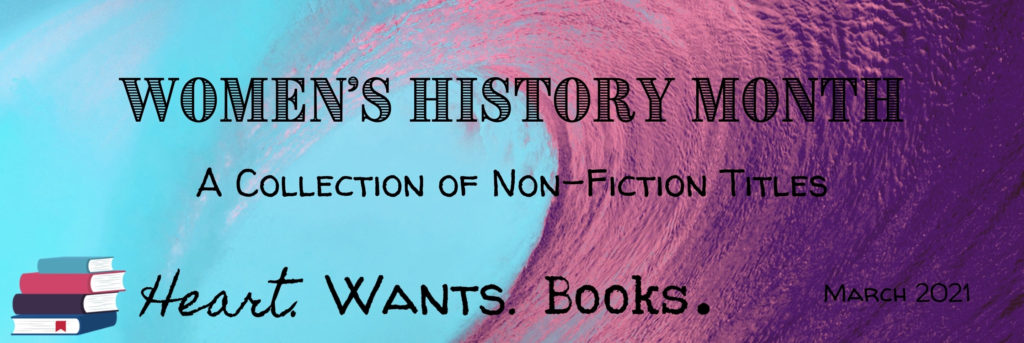
The following post includes affiliate links. More details here. As you’re doing your Amazon shopping, we’d be ever so grateful if you’d use our affiliate link to do so as it helps pay the bills around here!

It’s no secret that I have struggled to find nonfiction titles that keep me engaged. I’ve purposefully sought out some, embraced others whose titles or authors have landed in my life, and I’ve stumbled upon some titles that were fantastic. I’ve also found some authors whose names will always demand my attention because their words speak to me as a person. It should surprise no one that Anne Bogel is one of those authors. I read her blog and I listen to her podcasts, so purchasing her books is solidly in my “things to not overthink” category. If you’re interested in learning more from this woman who is a muse to my reading life, then please sign up here for Virtual Book Club on Friday, March 26th at 7:30 p.m. CST when we’ll discuss Don’t Overthink It: Make Easier Decisions, Stop Second-Guessing, and Bring More Joy To Your Life by Anne Bogel so we can learn more from Anne together.
I may struggle with nonfiction, but Ashley does not. So when we were deciding what books and topics to bring you during Women’s History Month, I fully expected she’d have some nonfiction titles in mind. The surprise for me was that it wasn’t for book reviews, at least not in our usual way. Sorry not sorry for the number of titles we’re throwing into the universe this month or today. Today, we’ve got nonfiction titles to share today covering the needs of three generations of women. While technically Gen X may be the generation that’s getting all the attention for raising kids and caring for parents at the same time, we elder millennials are right there with you Gen X folks (literally in my family, as my brother and I have both generations covered). I hope you find a title today that speaks to you or someone you love, and I hope you’ll share a title that has already spoken to you with us in the comments.
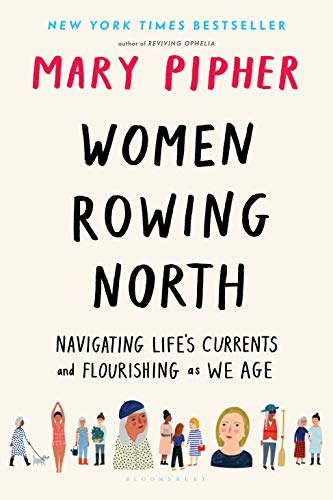
Am I the only one who can’t remember sometimes why I put a book on hold or recommended it to the library? Yes, cool. So, that’s the story with Women Rowing North by Mary Pipher, but y’all, this was good and it’s important. Pipher is a psychologist writing to her peers – women who are transitioning from middle to old age (she’s 70ish). I’m half that age, and read and adored this title. Perhaps it’s that my mother is in the target demographic (yes, that means she’s twice as old as me right now, which means she was pregnant with me at my age *shudder*), or perhaps it’s that there are a lot of important truths and life lessons in this book. I’m going with both.
Women Rowing North reads like a long (super long at 270 or so pages) letter to a friend, filled with stories and anecdotes of the author and others. It’s a celebration of the achievements of life and the joy those can bring as one “rows north.” Some stories are tragic, but they are filled with hope and love, leaving you with only those feelings, because when a life is well lived, even its end can be a celebration. Included are things to appreciate, things to realize, and truths to own. This is advice and stories to help women, people really, be their true selves and have peace in that, while living their best lives and rejoicing at all that has come to pass and all that may yet.
I never thought I’d thoroughly enjoy and be uplifted by a book about aging, but I am. I give Women Rowing North a solid four stars and I’ve already recommended it to my mom. I don’t plan on rereading this any time soon, but I hope to do so when I’m closer to the target audience, or maybe even next time I find myself in one of life’s major transitions. In the meantime, I’ll be checking out some of Pipher’s other titles, which have different themes because she’s a lovely writer and speaks glorious truths in a powerful way.

On the opposite end of the spectrum, I also read Raising Worry-Free Girls: Helping Your Daughter Feel Braver, Stronger, and Smarter in an Anxious World by Sissy Goff. This was not on my radar or TBR list until I heard the author’s conversation with Annie F. Downs on That Sounds Fun Podcast. Goff is a counselor, and Downs is a former teacher of fourth and fifth graders, so as a parent of a kindergartner and third grader with a host of other young people in my life, I was delighted to hear them talk about raising brave kids! Do know, Goff does counsel from a Christian perspective, and that is included in the book. Faith is included in her tools she offers parents and girls (in the book it’s girls, but it’s really relatable to boys too), along with Scripture too.
Even though Raising Worry-Free Girls is intended to be the parent’s guide to helping their children defeat the Worry Monster (along with Braver, Stronger, Smarter: A Girl’s Guide to Overcoming Worry and Anxiety – the companion for girls, and the brand new Brave: A Teen Girl’s Guide to Beating Worry and Anxiety), I learned a lot about me and my mom too. Goff talks about statistics of children who worry and their parents. As an enneagram 6, I feel like worry is ingrained in me by my mental committee, and I’ve seen at least some of the ways the worries of my parents and grandparents have manifested themselves throughout the years. Given all this, statistically, it’s likely my children will worry as well, but there is hope. There are tools included in the pages of this quick read (200+ pages) that I can use and I can guide my boys and other children in my life through as they demonstrate a need for that. My favorite part though, that was the positive affirmation because we’ve been doing some of the tools for a while now and they work when we use them well. I gleaned a lot from this plus even though I wasn’t the intended audience. If you are a person of faith, or one who can read through advice from a faith perspective, and have young people in your life, I highly recommend reading one of Goff’s parenting titles, whether it’s this one or another. I’m particularly interested in Modern Parents, Vintage Values: Instilling Character in Today’s Kids by Sissy Goff and Melissa Trevathan.
~Nikki
Ashley here. I have two titles and some seemingly random collections of Women’s History non-fiction titles that have been curated by others. Amazon did a whole heck of a lot of leg work with this great collection of titles with multiple themes you can click through. Please check out Amazon’s Amplify Women’s Voices list for ideas on your next feminist text. On a quick scroll through, the titles seem satisfactorily intersectional. In my notes from the first book I am going to discuss, I have a quotation from Jessica Valenti highlighted and I thought to myself as I was reading, man that name sounds familiar. Well, come to find out several of her titles are on my TBR list and they just haven’t made it through the proverbial gates to my tired, brown eyeballs and into my brain.
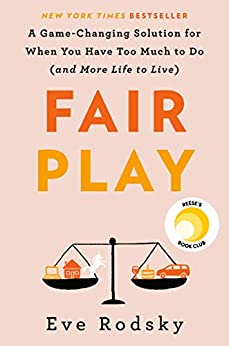
Fair Play by Eve Rodsky was the Reese’s Bookclub pick for October 2019. (Do we read a lot of Reese’s picks, yeah, it seems like it. But, without irony or surprise, Reese Witherspoon HAS EXCELLENT TASTE. And therefore I am unashamed that I allow her to choose my reading material.) [Secondly, as regards Reese and Women’s History month, please watch her 2018 Netflix series Shine On where she interviews groundbreaking women about their journeys. Queen Dolly Parton is the first interviewee. WORTH IT.] Back to Fair Play. The premise of the book is not surprising to most any woman with children: when you become a mother, you become the ‘she-fault’ parent and therefore the manager of the entire household no matter the equity of your household-load before children. Honestly, for many women, household management burdens begin before children enter the picture. Cohabitation with males of our species often involves the eventual, unequal yoking of household chores and other tasks that literally make life move forward for everyone. (Rodsky does state that many households are not heterosexual and may also be childless, but that the concept of Fair Play can be applied to any cohabitating couple. She wrote from her own experience and so I will write as she wrote, but note that Fair Play can be useful to most anyone who feels a disparity in their house as regards chores.)
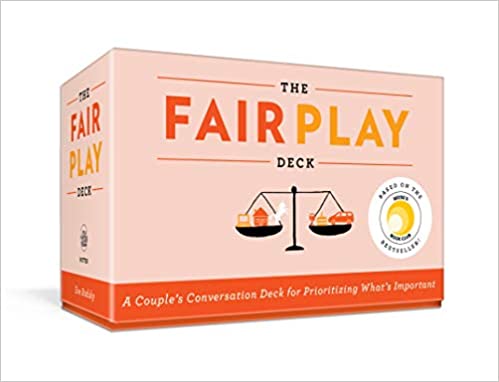
It began when she made a ‘shit I do list’ to give to her husband and that didn’t work very well. Then, Rodsky literally created a card game based on her list and the list of her friends and women in her position with young-ish children at home. They tested it over the course of months, and have packaged it up for us nicely for sale on Amazon. It includes approximately 100 playing cards, 60 of them useful for couples without children, of all the tasks that make life happen and enjoyable. The premise is that you and your partner come together, decide which cards are necessary for your family life to function, and deal them out until every card is gone. The person who accepts the card takes full responsibility for the action on the card, from conception to planning to execution, until cards are re-dealt. It’s an interesting concept and allows both partners to choose which parts of the ‘daily grind’ they accept full responsibility for. Daily grind cards are things like laundry, grocery shopping, cooking, cleaning, etc. Rodsky suggests switching those up very often, no one should be stuck washing dishes for the rest of their life, unless that’s what they truly enjoy doing. Partners also decide on what the standards for those actions will be for their household and the player who is not responsible for the card does not have to concern themselves with the card unless the minimum standard action for the card is not met. I give the book 3 stars because I’m a grown up and got really annoyed at the censoring of expletives in the text, but I really like the idea of full ownership and responsibility for a household chore from conception to planning to execution, rather than one partner being the micromanager for the entire house.
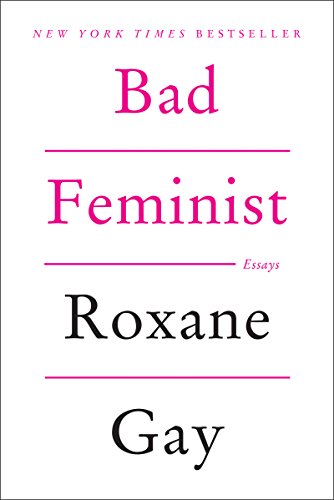
The second title I want to share is one that I’m not quite done reading yet, but at 80% I feel confident in saying that Bad Feminist by Roxanne Gay was worth all the real American dollars I spent to purchase the kindle book. If you remember from Thursday’s post about Rules for Being a Girl, it’s the title that Ms. Klein gives to Marin that sparks the idea of the feminist book club. It was published in August of 2014, so while many of the essays speak to current events, there have been many more unfortunate occurrences against women and people of color since its publication that make it feel a little out of date. Regardless, it’s a fascinating read and I’m so happy I chose to indulge in the purchase of such a seminal title in the modern feminist canon. This quote sums up Gay’s concept of a bad feminist:
I embrace the label of bad feminist because I am human. I am messy. I’m not trying to be an example. I am not trying to be perfect. I am not trying to say I have all the answers. I am not trying to say I’m right. I am just trying—trying to support what I believe in, trying to do some good in this world, trying to make some noise with my writing while also being myself: a woman who loves pink and likes to get freaky and sometimes dances her ass off to music she knows, she knows, is terrible for women and who sometimes plays dumb with repairmen because it’s just easier to let them feel macho than it is to stand on the moral high ground.
So that’s it for me, dear readers, please continue this list of non-fiction women’s history month and feminist titles in the comments below! We want to know what you recommend reading that will help support what we believe in.
~Ashley
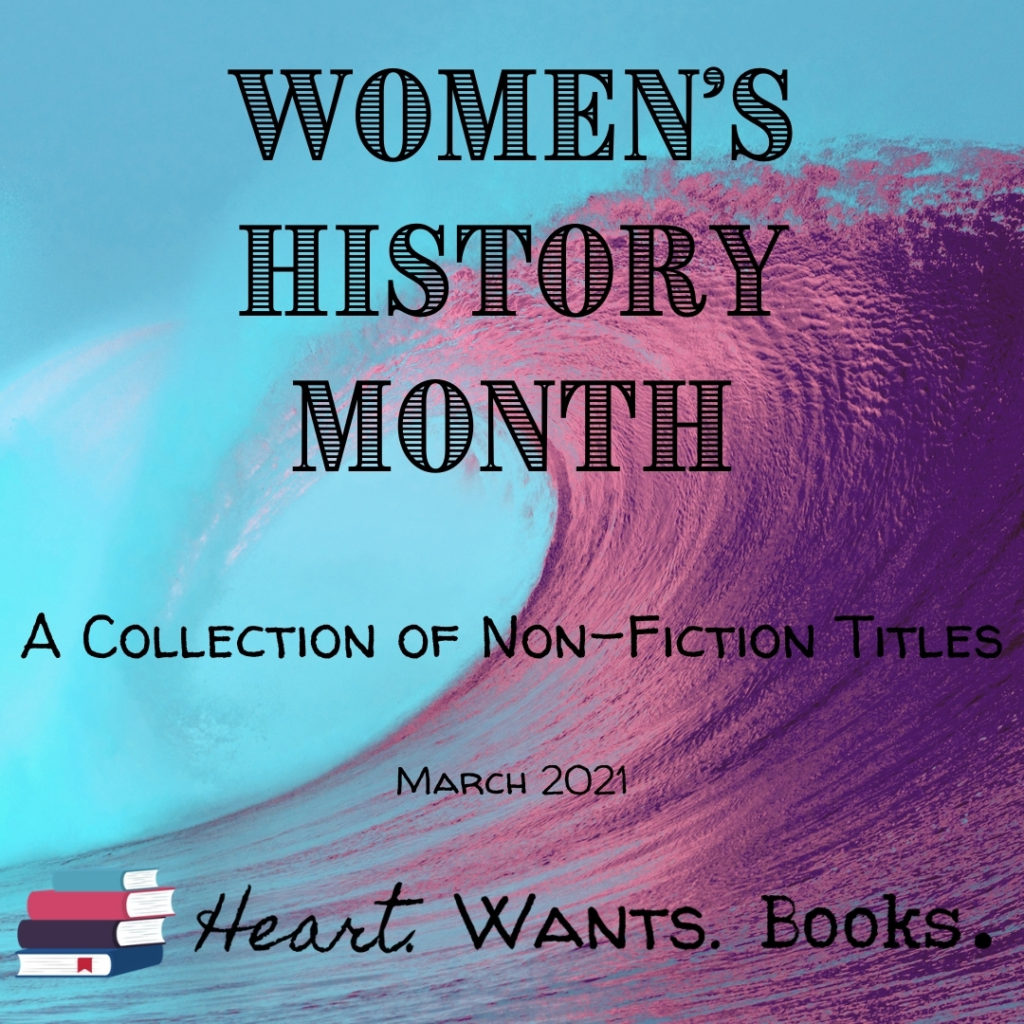
PLEASE SUPPORT US WHEN YOU SHOP BY FIRST CLICKING ON THE IMAGES BELOW:
Rules for Being a Girl by Candace Bushnell & Katie Cotugno
March 11, 2021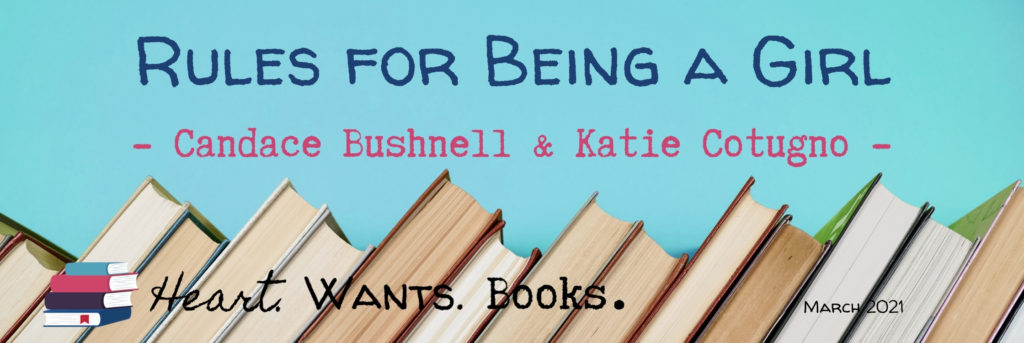
The following post includes affiliate links. More details here. As you’re doing your Amazon shopping, we’d be ever so grateful if you’d use our affiliate link to do so as it helps pay the bills around here!

Lemme give you a sneak peak of today’s title, the rule for being a girl should be don’t overthink it (yes, this is most definitely me shoulding on society). We all know things are more complex than that because dumb reasons that involve mostly people not being kind and trying to steal the joy of others. I’m not here for that, but I am here for a book on the exact opposite, and I hope you are too. If you are, then sign up here for our next Virtual Book Club on Friday, March 26th at 7:30 p.m. CST when we’ll discuss Don’t Overthink It: Make Easier Decisions, Stop Second-Guessing, and Bring More Joy To Your Life by Anne Bogel. My guess is that Anne will be very upbeat but also real and kind, perhaps not as snarky as today’s title, but y’all, I love some snark.
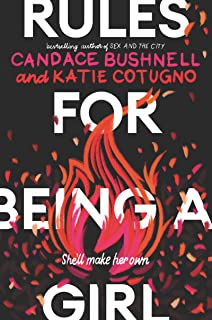
Dear readers, I tried to #blameAnne for Rules for Being a Girl by Candace Bushnell and Katie Cotugno, but I can’t find a source list or episode, so that’s probably not it. Oh well, I just wish I did know how this title landed on my TBR so I could say “please, may I have another” and also rage about the truths contained herein. (Ashley’s claiming responsibility, and she already adds to my TBR, so I’m set.) We are hanging out in high school again this week, and even though I’m over that, I’m NOT over this title, which I read consumed in about 24 hours (including a work day, where I was actually at work). Bushnell and Cotugno drew me in with Marin, who academically reminds me a lot of myself, and of Ashley (I *may* have texted her and said “3% spoiler time: The narrator is academically our people.”) I, unlike Marin and Ashley, was smart enough to realize that college English through our local community college was much easier than AP English and took the easy way out (even though Ashley and I both had to “repeat it” in honors classes – see Monday’s mention of lengthy reading lists), but I digress. [Ashley adds that she didn’t take the AP English TEST because she wouldn’t need the credit and didn’t want the added stress at the end of senior year BECAUSE of said Honors College required freshman English courses.] Marin is a high school senior with the world open before her after she finishes her senior year. She’s loved by her teachers, friends, parents, and even her boyfriend. Marin doesn’t pay enough attention to secrets though. My mother always told me, as her mother told her, if I didn’t want her to find out about it, I shouldn’t be doing it. While I did not always heed that advice, it holds true. But legit, when Marin’s teacher asks her to keep a secret, IT SHOULD HAVE BEEN A CLUE. It was a clue for me in the form of a giant, glaring red flag, and then I was screaming at her next time. Let’s be very clear dear readers about trigger warnings, if Marin and Bex were the same age, they could have had a miscommunication and nothing more would have come of it. The issue came about because he was in a position of power. My issue stems from him knowing it was wrong before he did it, yet he did it anyway. (This is in the marketing copy, so it’s not a spoiler.)
The powerful pieces of Rules for Being a Girl aren’t what Bex does, but how Marin reacts. It takes her a bit, but she finds her voice. THAT is my favorite part of this book, starting with the actual high school newspaper editorial that highlights all the struggles of all the lies we’ve been raised up on, been taught by society and the patriarchy. Marin finds a teacher willing and able to pour into her and help her grow and use her voice, find her people, and that is the true joy of this book. Did I want more ending? Oh most certainly, but also, the ending we get in Rules for Being a Girl feels right. I don’t even want an extended epilogue because I want Marin to be able to write her own story, and all the readers her age who read this to imagine themselves and the future they want in Marin’s place.
Overall, I give Rules for Being a Girl 4.5 stars, which I’ll round up to 5. This title is well written and powerful, and I am here for it! We all need the joy of finding our people, even if we need to learn the lessons required to do so the hard way. I am not certain I’ll reread this book, but I am very confident I’ll recommend it. I also want to share two things before we go. Thing that didn’t need to be included but was SO powerful: a feisty grandmother, because we all need more of this! Things I did not appreciate about this book: the teacher is younger than me. Y’all, I was not ready, this is not ok.
What’s a book that makes you cringe but also so excited about the character development?
~Nikki

I had heard of Candace Bushnell as an author for many years, but I haven’t read her 1996 debut novel, and her most famous, Sex and the City, which was the basis for the hit HBO series and two follow up movies. This New York Times Best Selling author’s books Lipstick Jungle and The Carrie Diaries were also made into popular television shows. Rules for Being a Girl is her tenth novel and her first co-authorship.

Katie Cotugno is a New York Times Best Selling author of six full-length YA novels and multiple short works. Her website tagline is “messy, complicated, feminist love stories” and I’m here for all of the above. She writes under the pseudonym Ruby McNally to differentiate from her YA titles and to allow herself to write “smart, edgy, feminist love stories that are just a bit more grown-up.” What I’m understanding is that it means there’s sexytimes, and I’m here for all three of those in that type of genre.
It took me a few false starts to figure out what I actually wanted to write about for today’s book review of Rules for Being a Girl and I latched on to the idea that this fictional story of one girl’s experience of sexual assault (minor spoiler, it was a kiss, but an unwanted kiss!) by a teacher is a textbook example of many girls’ sexual experiences at some point in their young lives, whether it be by a peer or someone older than themselves. Marin doesn’t know how to handle the emotions that come with such an experience, no one knows how it feels until it happens to them. Her inner monologue is at times righteously angry and frustratingly submissive. I am angry to know that I am not alone in realizing that girls are conditioned to think that in some way it is their fault for assault, that they are ‘asking for it,’ that they didn’t take the right precautions against unwanted or unasked for sexual attention. I am upset for Marin and every girl who thinks that their righteous anger at being assaulted is unjustified and the subsequent indignities the current system puts her through are justified. These things are NOT ok, and we need to do better for our girls (and boys).
It’s stated in the marketing copy, so this is not a spoiler, but Marin starts a feminist book club with the help of science teacher Ms. Klein. The best quote comes from the first book club meeting. We meet Eliza Hernandez, captain of the girls volleyball team. Eliza admits that the team is defending their title for state champion. Marin, co-editor of the school newspaper, admits that she didn’t know her school’s volleyball team was defending their state championship title and that it was obnoxious that there was no school pep rally scheduled for the team – but that the school’s mediocre at best football team received multiple pep rallies during their season. Eliza drops the bomb that the volleyball team can barely get a bus to take them to away games. Marin narrates: “It’s like now that I am looking for inequality, I’m seeing it everywhere, categorizing a thousand great and small unfairnesses everywhere I go. Why didn’t I see this before?”
The easiest answer to this question is because she wasn’t looking for it. Knowing the inequalities exist is one thing, but until you, or someone very close to you, has experienced these inequalities inherent in the system for yourself, most of the time one is not going to go looking for the ways the patriarchal, racist system keeps us all down. I say most of the time because there are those people who do not suffer from specific systemic inequalities but who do do the hard work to become educated, changing themselves and working towards changing the system.
Rules for Being a Girl, with it’s happily rounded to 5-star read, has put a wrench in my reading life this week because I thought I was just going to jump into the next books Nikki and I had already chosen for the blog, but when Bad Feminist by Roxanne Gay was given to Marin by Ms. Klein, and it had such a profound effect on Marin, I knew that I had to expand my own feminist education. I spent real dollars on the purchase of the Kindle book. Stay tuned for Monday’s post where we bring you some thought provoking non-fiction titles for Women’s History Month.
Has a fiction story ever derailed your reading train as Rules for Being a Girl has done to mine? If so, what story made the change in your itinerary and where did it take you?
~Ashley
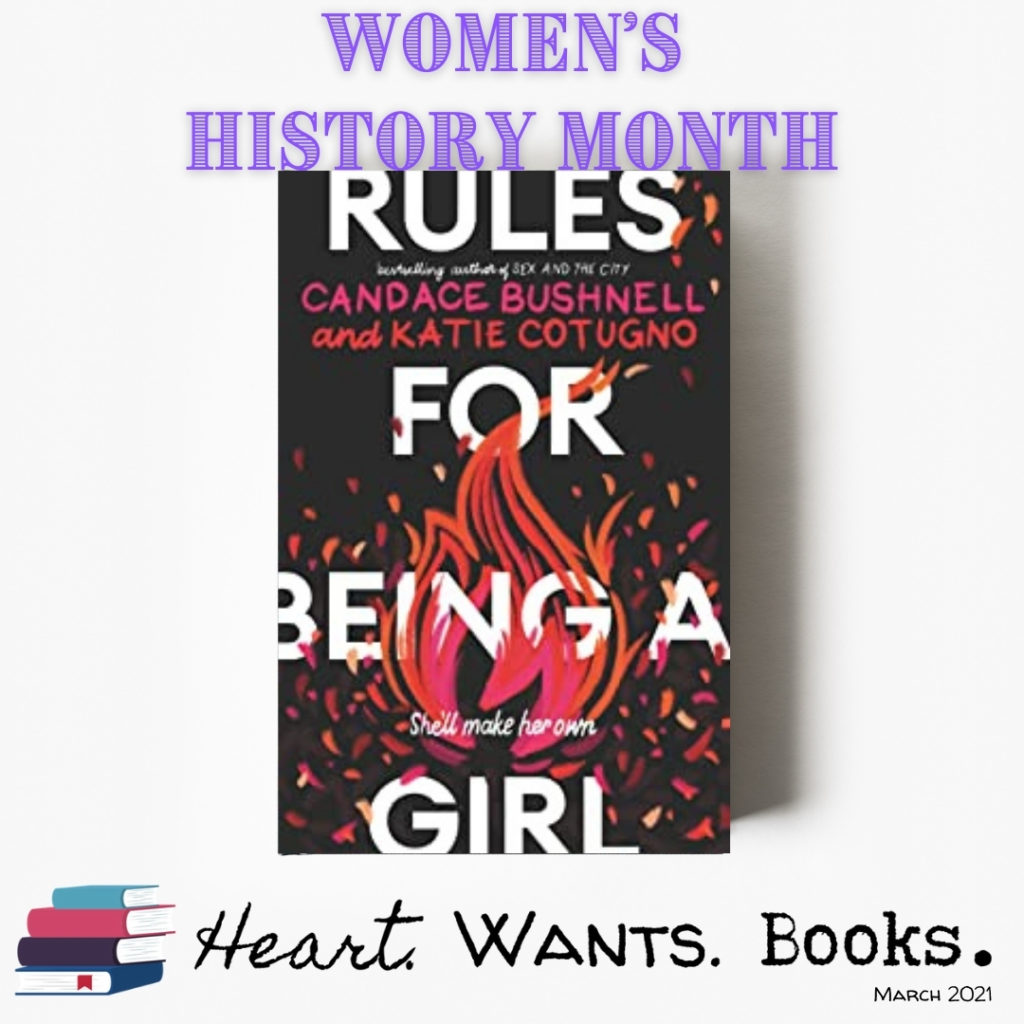
PLEASE SUPPORT US WHEN YOU SHOP BY FIRST CLICKING ON THE IMAGES BELOW:
- « Previous Page
- 1
- …
- 52
- 53
- 54
- 55
- 56
- …
- 86
- Next Page »

